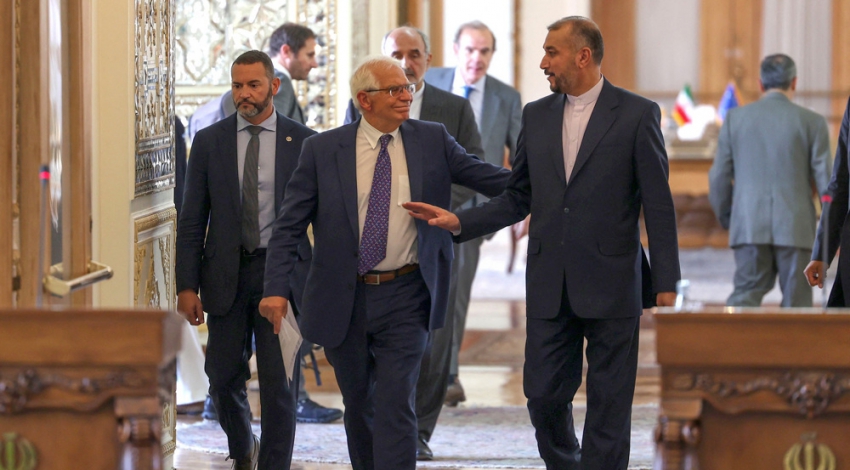Friday 1 July 2022 - 22:04
Story Code : 398173
Doha talks: Iran says will coordinate with EU on next stage
"Our team is ready to engage constructively to reach a deal," Majid Takht Ravanchi said in a post on his Twitter account after he delivered a speech at a meeting of the UN Security Council on Thursday.
The top Iranian diplomat added that the sides to the deal, officially known as the Joint Comprehensive Plan of Action (JCPOA), can reach a final agreement on the revival of the multilateral agreement in case of the US acts realistically and shows�seriousness.
"If US acts realistically & shows serious intention to implement its obligations, agreement is not out of reach," Takht Ravanchi said.
The Doha talks started on Tuesday, in a high-stakes diplomatic process aimed at breaking the stalemate in efforts to restore the JCPOA,�with EU coordinator Enrique Mora shuttling between Iran's top negotiator Ali Bagheri Kani and Robert Malley, the US special envoy for Iran.
At the end of the talks on Wednesday, Iran and the EU said they would keep in touch "about the continuation of the route and the next stage of the talks."
The EU�is tasked with coordinating indirect negotiations between Iran and the United States during the process. Iran does not�sit down with the US as it is no longer a party to the deal.
The talks in Doha follow�several rounds of negotiations in the Austrian capital of Vienna since April last year to restore the JCPOA, which was unilaterally abandoned�by former US President Donald Trump in May 2018.
In quitting the agreement, Trump restored sanctions on Iran as part of what he called the �maximum pressure� campaign against the country. Those sanctions are being�enforced to this day by the Joe Biden administration, even though it has repeatedly acknowledged that the policy�has been�a failure.
The Vienna talks reached an impasse and were suspended in March over Washington�s refusal to remove all the post-JCPOA sanctions, including the "foreign terrorist organizations" designation of the�Islamic Revolution Guards Corps (IRGC).
Iran has also demanded that the US provide guarantees a future administration would not withdraw from a restored deal again, something the Biden administration has not been able to do.
The Doha talks kicked off just a few days after European Union foreign policy chief, Josep Borrell, visited Tehran seeking to break the impasse.
US must respond positively to Iran�s reasonable demands: China
On Thursday, China's permanent representative to the United Nations told a Security Council briefing on the Iranian nuclear issue that the United States, whose unilateral withdrawal has caused numerous problems, must respond positively to the reasonable demands of Iran.
�As the initiator of the Iranian nuclear crisis, the United States should face up to its responsibility, correct its mistake once and for all, make a political decision as soon as possible, and take concrete measures to respond positively to the reasonable demands of Iran,� Zhang Jun said.
�The previous US administration, in disregard of objections from the international community, unilaterally withdrew from the JCPOA and launched a maximum pressure campaign against Iran. We must admit that is the root cause of the current Iranian nuclear crisis.�
Pointing to Washington's double standards on Iran, he said the US has repeatedly expressed its readiness to return to compliance as per the JCPOA but it is nevertheless ramping up sanctions against Tehran and third parties even during the process of talks.
"Doing so is obviously detrimental to any positive progress in the talks. The United States should live up to its words and lift all relevant unilateral sanctions and long-arm jurisdiction measures against Iran, so that Iran can fully partake of the economic dividends of the JCPOA," the Chinese diplomat said.
Zhang underscored the importance of abandoning double standards in order to keep the talks on the right track with a view to an early outcome. He said all parties must strictly abide by the Treaty on the Non-Proliferation of Nuclear Weapons (NPT) as the cornerstone of the international nuclear non-proliferation regime.
There is no better alternative to the JCPOA as dialog is the only right way forward in the resolution of the current crisis, Zhang said.
The Chinese envoy said Beijing welcomes and supports all efforts conducive to the peaceful resolution of the crisis, welcomes the reopening of the Doha talks, and appreciates the recent good offices by the European Union.
The Chinese diplomat expressed hope that the EU, as the coordinator, would continue to play its unique role and work harder to encourage greater flexibility from the parties. He, however, called for ridding the negotiation process of interference.
�As we approach the final hurdle, it is all the more important for all parties to firm up confidence, reject any and all interference, and preserve the hard-won results of the negotiations achieved to date.�
Zhang urged all parties to exercise restraint and refrain from taking unconstructive steps that would badly impact the circumstances.
He further voiced his country's objection to the politicization of the International Atomic Energy Agency (IAEA)'s mandate, which has been reflected in the anti-Iran resolution recently adopted by the agency's Board of Governors, saying Beijing supports settling outstanding issues through dialogue and cooperation between Iran and the UN nuclear watchdog.
By PRESS TV
# Tags











